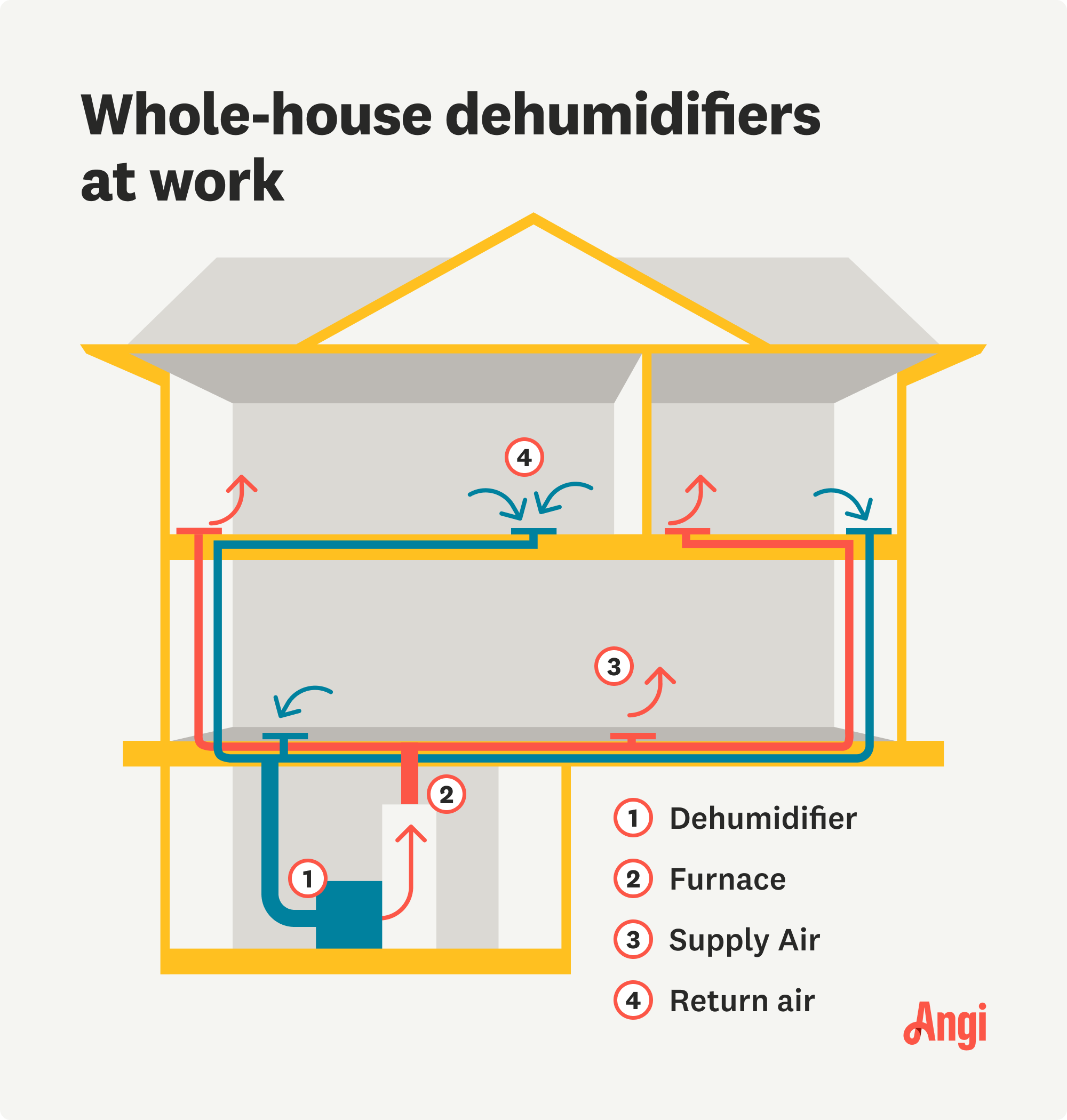Who Installs Whole-House Dehumidifiers?
If you need a whole-house dehumidifier, leave it up to a local HVAC professional


Too much humidity can leave your home feeling muggy. Not to mention it provides the ideal environment for mold and mildew. Don’t let that dampen your spirits, though: A local humidifier installer can add a whole-house dehumidifier to maintain the proper relative humidity. Here’s everything you need to know about the job.
Benefits of Hiring an HVAC Professional to Install a Whole-House Dehumidifier
Aside from the stuffiness, humidity provides the perfect conditions for mold and mildew growth. Fruits, bread, and any perishable foods left outside the fridge might develop fuzz before you know it (as if you needed another thing limiting your window for eating an avocado). Plus, these spores can disperse in the air, aggravating allergies and causing other health problems for your family. Too-high humidity levels can also ruin your book collection and even cause your hardwood floors to warp or buckle.
Benefits to hiring an HVAC technician to install a whole-house dehumidifier include:
Ensuring proper functionality of your dehumidifier
Finding the best unit and installation method for your home’s unique needs
Maintaining compliance with local code regulations
Saving you time
Preventing potential damage to your home or the unit
Can You Install a Whole-House Dehumidifier Yourself?
Knowing how to install a whole-house dehumidifier requires professional expertise—not just to guarantee that it functions properly but also to ensure compliance with local codes. However, there are plenty of other things you can do to lower your home’s humidity.
Controlling the humidity in your home is all about proper ventilation—and limiting common moisture-causing culprits. Along with getting a whole-home dehumidifier, here are some of the best ways to control your home’s relative humidity:
Use exhaust fans while cooking
Limit indoor plants, especially during the winter months when there is less ventilation
Vent your dryer directly outside
Ensure your home’s HVAC system is running properly
Ideally, the relative humidity in your home should be at 30% to 50%. To check this, you can buy an indoor monitor online or at your local home improvement store. With many models costing less than $20, this is an accurate and affordable way to determine humidity levels throughout the house. Should you find the numbers landing higher than 50%, it’s time to consider a whole-house dehumidifier.
How Do Whole-House Dehumidifiers Work?
Whole-house dehumidifiers come in various sizes based on how much water they can remove from the air in a day. An HVAC technician near you will factor in the normal humidity where you live, how much humidity your home’s AC system already dissipates, and whether you have a basement or crawl space that holds moisture.

At a high level, a whole-house dehumidifier works by:
Cools the air with an evaporator coil.
Collects water vapor in a reservoir tank.
Funnels water away from the home through a drain line.
Leaves existing air to be cooled by your home’s air conditioning unit.
Plan to get multiple estimates from contractors who are appropriately licensed, insured, and bonded. As always, it’s wise to look for pros with specific experience installing whole-house dehumidifiers, as well as positive consumer reviews.
How Much Does a Whole-House Dehumidifier Cost?
The average cost to install a whole-house dehumidifier is about $1,300 to $2,800. Although this can seem like a steep upfront cost, it’s an investment that will improve your indoor air quality.
In some cases, you may also be able to choose a basement dehumidifier that can hook up to ductwork and control humidity levels throughout your home. Prices will vary based on factors such as the size of your home, your existing HVAC system, and the climate where you live.
Frequently Asked Questions
Installing a whole-house dehumidifier is worth it for several reasons, including better indoor air quality, increased comfort, and lower energy bills. Dehumidifiers are especially worth it if you suffer from allergies, as they can reduce irritants like mold spores, mites, and dust. Financially, dehumidifiers save money by helping your air conditioners work more efficiently, which translates to better energy efficiency. They may also help lengthen the life span of your electronics by protecting them from moisture.
You can add a dehumidifier to your HVAC system because it can work with your HVAC to remove moisture from the air and improve your home's air quality. Adding a dehumidifier to an HVAC system can also extend its life span because it helps the system work more smoothly and efficiently. It can also help reduce the likelihood of mold and mildew growing in your HVAC system.





- Furnace Repair
- Air Conditioning Repair
- HVAC Repairs
- Furnace Installation
- Wood & Pellet Stove Repair
- Dehumidifier & Humidifier Repair
- Heat Pump Companies
- Swamp Cooler Repair
- Wood Stove Services
- HVAC Companies
- Commercial A/C Repair
- Geothermal Installation
- Air Conditioning Installation
- Boiler Repair
- 24 Hour Furnace Repair
- Geothermal Repair
- Heat Pump Repair
- Humidifier Installation
- Thermostat Repair
- Thermostat Installation
- Nest Installation
- Heating & Cooling
- Heating Repair
- Furnace Cleaning
- Furnace Tune-Up
- HVAC Technicians
- Subcontractors
- Furnace Maintenance
- Plumbing & Heating Companies
- Wood Stove Inspection
- Mini Split Installation
- Wall Heater Repair
- Duct Installers















